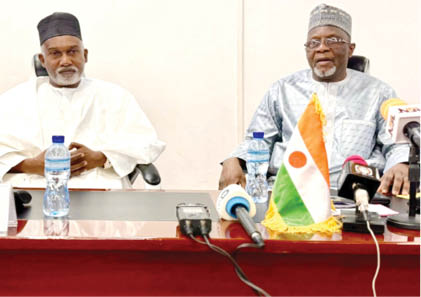A high-level Nigerian delegation, led by Minister of Foreign Affairs Yusuf Maitama Tuggar, met with officials from the Republic of Niger in Niamey on Wednesday, marking a major step toward repairing strained bilateral relations following the July 2023 coup in Niger.
Tuggar, who arrived in Niamey on Tuesday, delivered a special message from President Bola Ahmed Tinubu to Niger’s Head of State, General Abdourahamane Tchiani. The delegation included senior diplomats, policy experts, and defence liaison officers, engaging in wide-ranging discussions on security, trade, and regional cooperation.


Key Discussions and Resolutions
A joint communiqué released after the meeting noted that talks were held in a cordial atmosphere, allowing for frank dialogue on sub-regional and international challenges. The two nations reaffirmed their commitment to revitalizing the Nigeria-Niger Joint Commission (NNJC) to foster stronger cooperation.
Issues discussed included:
- Enhanced economic collaboration, including the operationalization of cross-border markets and joint infrastructure projects such as the Kano-Katsina-Jibiya-Maradi railway, Trans-Saharan Gas Pipeline, and Trans-Saharan Highway.
- Cooperation on energy, telecommunications, agriculture, air services, education, and desertification.
- Strengthening border security and tackling terrorism threats along shared frontiers.
The ministers emphasized the need to establish a Joint Consultative Forum to coordinate responses to common challenges and deepen mutual understanding between both nations.


Security Concerns
Both countries acknowledged the growing threat of terrorism along their border as a major obstacle to development. The ministers urged their respective defense ministries to intensify security collaboration and revive regular high-level exchanges under the NNJC framework.
They also stressed the importance of maintaining cultural, social, and political ties between border communities historically linked by shared heritage.
Behind the Diplomacy
While the talks were publicly led by Nigeria, sources within the Nigerian Ministry of Foreign Affairs hinted that Niger had quietly initiated the engagement, preferring to keep their overture out of the spotlight. This mirrors past situations where Niger discreetly sought Nigeria’s assistance, such as during recent fuel shortages.
Expert Commentary
Former Nigerian Ambassador Suleiman Dahiru welcomed the diplomatic initiative, calling it timely and necessary. “Nigeria isn’t begging; it’s leading,” he said, praising the government for taking the first step.
He also expressed hope that the talks would lead to a thaw in relations that deteriorated due to ECOWAS sanctions and perceived heavy-handedness by Nigeria following the coup. “Niger felt betrayed, but dialogue is the only way forward,” Dahiru stated.

Context: A Year of Tensions
Since the 2023 military coup in Niger, Nigeria has pursued a mix of pressure and diplomacy, attempting to uphold democratic norms under ECOWAS protocols while preserving economic and security ties.
Although ECOWAS imposed sanctions and threatened military intervention, Nigeria continued to advocate dialogue, sending emissaries such as former Head of State Gen. Abdulsalami Abubakar and maintaining discreet economic support to Niger.
Impact of the Diplomatic Rift
The breakdown in relations had significant repercussions:
- Economic: Niger faced fuel shortages due to reduced cross-border supply, while Nigeria lost revenue from trade.
- Social: Border communities in both countries were cut off, disrupting long-standing family and cultural ties.
- Security: Joint anti-terrorism operations weakened, exposing vulnerable regions to insurgent activity. Borno State in Nigeria saw a rise in attacks, highlighting the cost of disjointed security efforts.
The Rise of AES and ECOWAS Fractures
Niger’s alliance with Mali and Burkina Faso under the Alliance of Sahel States (AES) and their withdrawal from ECOWAS deepened regional divisions. These countries accused ECOWAS of being influenced by Western powers and failing to address Sahelian security challenges effectively.
The AES bloc has sought to chart a new geopolitical path, including developing closer ties with Russia, signaling a shift away from traditional ECOWAS structures.
Moving Forward
Despite challenges, Nigeria remains committed to dialogue, emphasizing the need for regional stability. ECOWAS has left the door open for AES countries to reconsider their withdrawal, offering a six-month grace period and maintaining trade and migration privileges.
Observers hope that the renewed engagement between Nigeria and Niger could set the stage for broader reconciliation across the West African region.




